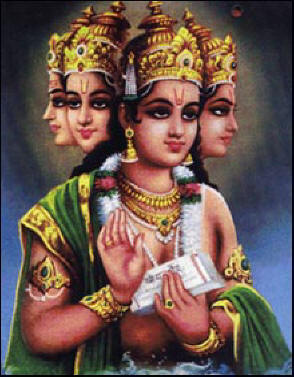
 According
to Purans :
Brahma
is the god, first represented in the Hindu Triad. He is the
creator of the universe and all living beings are said to
have evolved from him.
Brahma is considered having four heads with white beard and
four arms. His hands hold a kamandal, a rosary, a sacrificial
ladle and the Vedas. Brahma is sometimes depicted as sitting
on a lotus. The four Ved's are said to have originated from
his head. The four castes are also believed to have originated
from Brahma. The Brahmin's from his head, the Kshatriyas from
his arms, the Vaishyas from his thighs, and the Shudras from
his feet.
Lord
Brahma's one day is called a kalp, the creation of Brahma is
called vikalp and the creation of the total creation is called
mahakalp.
In
the Skand Puran, Brahma's thirty days are mentioned :
Each
day of Brahma is a duration of one thousand divya yugs. A divya
yug comprises of one thousand of the four yugas. The same duration
comprises his night.
In
the beginning Brahma created the four Kumars; Sanak, Sanand,
Sanatan and Sanat Kumar.
Brahma
asked his four sons to generate progeny. The Kumars declined
so, Brahma created his 10 mind born sons.
Brahma's
mind born sons are the seers Mareeci, Atri, Angiras, Pulastya,
Pulah, Kratu, Pracetas known as Daksh, Vashisht, Bhrgu and Naarad.
From
Brahma's body came his nine sons Daksh, Dharma, Kama, Anger,
Greed, Delusion (Maya), Lust, Joy, Death and Bharat and one
daughter called Angaja.
Some
accounts also say that Agni is the first son of Brahma. Agni
was married to Swaha and has three sons Pavak, Pavaman and Suchi.
Swadha was his second wife. Both his wives are invoked while
pouring oblations in the fire or making offerings in Yagna and
other religious rituals.
Brahma
created 1 Prajapati and 9 Brahmins, who are believed to be the
fathers of the human race. Their names, according to the Manusmriti
are Marichi, Atri, Angiras, Pulastya, Pulah, Kratu, Vasishth,
Daksh, Bhrigu, and Narad. These are believed to be born from
the mind of Brahma. He is also believed to have created the
Saptarishi or seven great sages to help him create the universe.
The world is said to exist for one kalp or one day in the life of Brahma. At the end of a kalp the whole world is destroyed. Brahma is then believed to go to sleep for one night which is as long as a kalp. When he awakens he recreates the world. This process (pralaya) is repeated for 100 years of Brahma which is the life span of one Brahma. Then everything dissolves into its constituent elements. This whole process is repeated unendingly. Brahma's abode is known as Brahmalok, which is said to contain all the splendors of earth and of the heavens of the other gods. His vehicle or vahan is a white swan or goose which has magical abilities. The swan or goose can separate som and milk from water. Therefore this bird is also a symbol of sifting good from evil. Unlike other deities Brahma does not have a weapon. Being the lord of sacrifices he is identified with a scepter in the form of a spoon. His consort is Sarasvati the goddess of wisdom and science, the mother of the Veds, and the inventor of the Devanagari script. She is represented as a fair woman with four arms, dressed in white and seated on a white lotus. As goddess of the arts she is shown playing or holding a veena. In one of her right hands she holds a book of palm leaves and in the other a lotus. In her left hand she has a string of pearls and a damaru. |
||||||||||||||||||||||||||||||||||